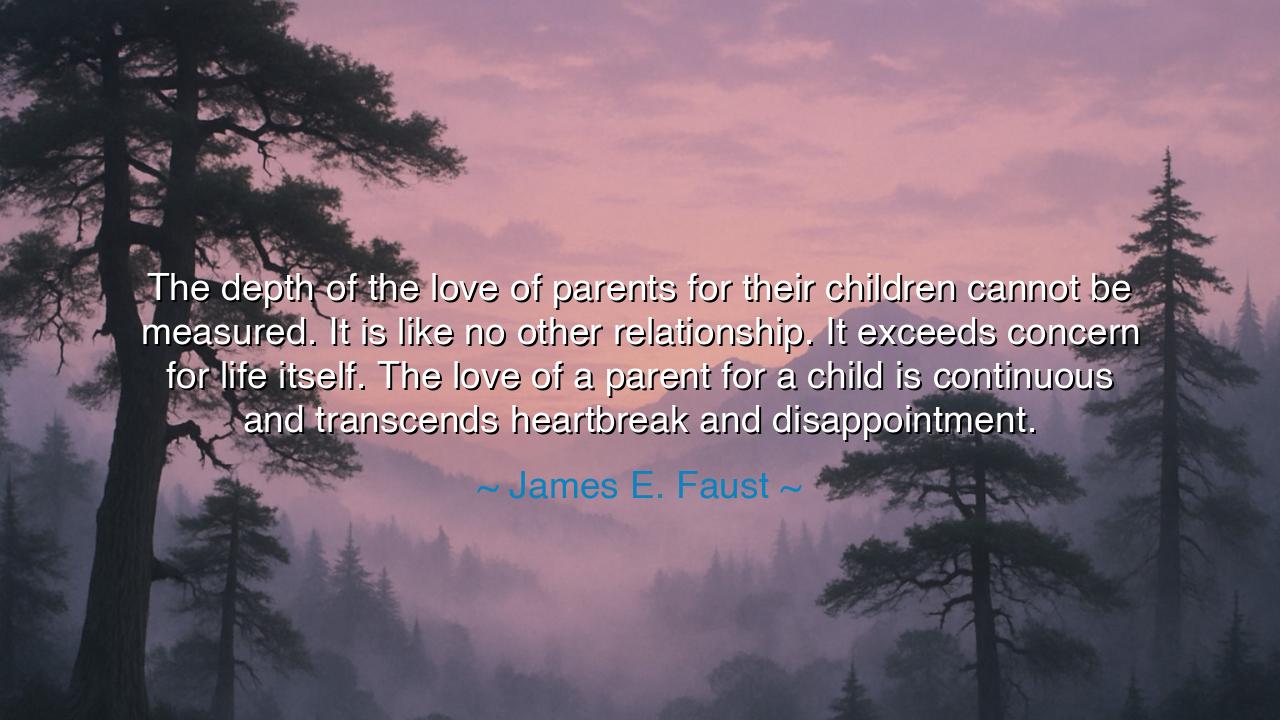
The depth of the love of parents for their children cannot be
The depth of the love of parents for their children cannot be measured. It is like no other relationship. It exceeds concern for life itself. The love of a parent for a child is continuous and transcends heartbreak and disappointment.






Hearken, children of the ages, to the words of James E. Faust, who speaks of the sacred bond between parent and child: "The depth of the love of parents for their children cannot be measured. It is like no other relationship. It exceeds concern for life itself. The love of a parent for a child is continuous and transcends heartbreak and disappointment." Here lies a teaching of devotion, sacrifice, and the eternal currents of the human heart, which flows deeper than time, circumstance, or comprehension.
Know that in these words there is humility and reverence. The love of a parent is not bound by logic, nor diminished by struggle. It is a force primal and unyielding, surpassing even the instinct for survival. Faust teaches that this bond is the cornerstone of human existence, a wellspring of protection, guidance, and unwavering care, shaping the soul of both giver and receiver alike.
Yet, consider also the resilience inherent in such love. Though the heart may face trials, misunderstandings, or the sorrows of a wayward path, the relationship endures. The love of a parent does not falter; it transcends heartbreak and disappointment, becoming a quiet, unbroken flame that illuminates the life of the child, even in moments of separation or strife. The ancients would counsel that this is the highest measure of loyalty and devotion, a testament to the power of the human spirit.
And behold, there is heroism in such constancy. To love without condition, to endure the wounds and challenges of life while holding the child at the center of the heart, is an act of courage and sacred strength. James E. Faust’s insight teaches that the concern of a parent is eternal, surpassing every temporal fear, every worldly anxiety, and even the shadow of mortality itself.
Thus, remember, future generations: honor the love of those who nurture, protect, and guide you, for it is like no other bond. The relationship between parent and child carries a depth that defies measure, a constancy that outlives hardship, and a light that guides even through the darkest of times.
In the end, the ancients would say: treasure the sacred flame of parental love, for it is a force beyond reckoning. It shapes hearts, molds character, and whispers to the soul across generations. To understand and honor this relationship is to glimpse the divine in human form, to feel a love that exceeds life itself, eternal, enduring, and unshakable.






TPNGUYEN VU TUYET PHUONG
I think this quote captures the essence of a parent’s love, which is often beyond anything else. However, it makes me wonder—can this love sometimes lead to unhealthy dynamics? Do parents sometimes go so far beyond heartbreak and disappointment that they unintentionally enable unhealthy behaviors in their children? How do parents ensure that their love doesn’t become a barrier to growth or independence for their children?
NHNguyen Hoang
Faust’s quote brings a beautiful perspective on parental love, but it also raises an interesting question about expectations. If a parent’s love is supposed to transcend all disappointments, what happens when parents feel disappointed or let down by their children? Does the love they feel still hold the same weight, or does it evolve over time? How do parents continue to love deeply without feeling that their sacrifices are in vain?
PUPhuong Uyen
James E. Faust's words really make me think about the sacrifices that come with being a parent. The love he describes seems so deep that it surpasses even the most challenging moments in life. But does this deep love sometimes lead to a sense of loss for the parents themselves? How do they reconcile their selfless love with their own needs and identity? Can they truly love without losing part of themselves?
KPGia Khang Phan
This quote highlights the limitless and enduring nature of parental love, which seems to go beyond any other relationship. But I wonder, can a parent’s love ever be too much? Sometimes, it seems like parents can be so invested in their children’s lives that it becomes a form of pressure. How do parents balance loving their children unconditionally while also allowing them the freedom to grow and make their own choices?
HLHai Long
James E. Faust’s quote really resonates with me because it touches on the profound and often indescribable love that parents have for their children. It’s a love that transcends all else, no matter the circumstances. But how does this unconditional love shape a parent’s sense of self and their approach to challenges? Can it ever be too overwhelming for parents to bear, or does it always strengthen them through adversity?